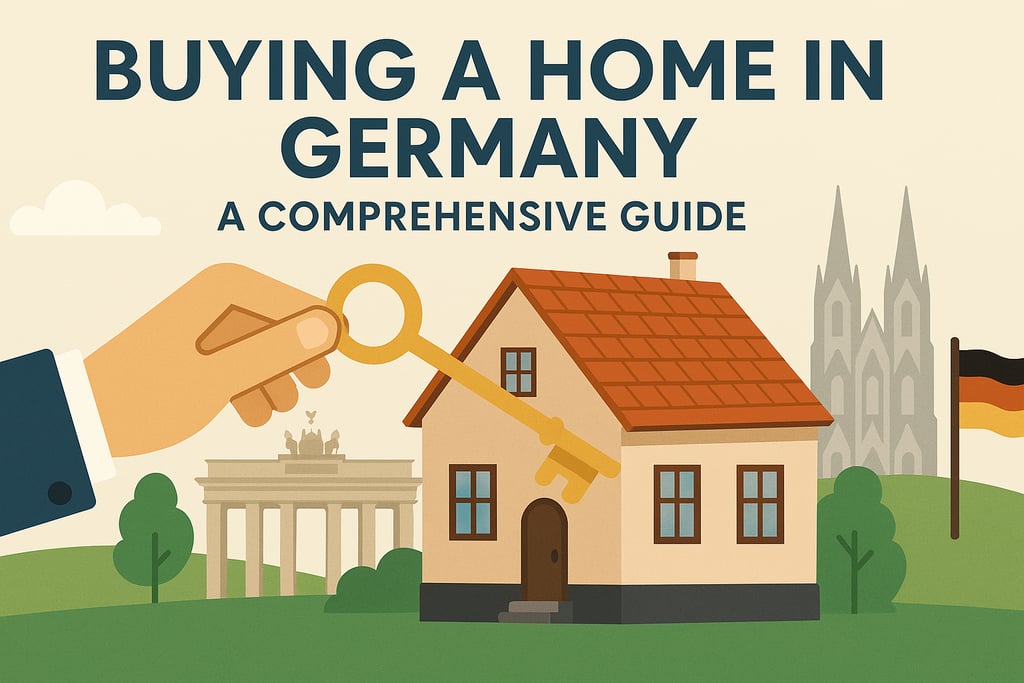Buying a Home in Germany: A Comprehensive Guide
PERSONAL
4/10/20258 min read


Buying a Home in Germany in 2025 – A Practical Guide for Locals & Expats
(≈ 1,950 words; updated July 7 2025)
Buying real estate in Germany is at once comforting and daunting. Comforting, because the entire process is tightly regulated, guided by civil‑law notaries, and underpinned by a land‑registry system that has hardly let a forged deed slip through since the nineteenth century. Daunting, because an alphabet soup of taxes, bank jargon, and regional quirks can leave even lifelong residents confused, let alone newcomers trying to decode the difference between a Tiefgarage and a Teilungserklärung. What follows is a single narrative that walks you from first budget pencil‑scratches all the way to unlocking your new front door. I have deliberately kept the prose continuous, avoiding chunky bullet lists and tables so that you can copy, paste, or expand any paragraph without having to wrestle with formatting. Where numbers matter they still appear, but always wrapped in sentences, not spreadsheet grids.
Related reading. If you are new to personal finance, consider starting with our explainer What is Money?, and if you need inspiration to build that painful first down‑payment, glance at The Piggy Bank Magic to see how compounding rewards patience.
1 Translating Dreams into Numbers
Imagine you have fallen in love with a sunny two‑bed flat in Berlin‑Moabit. The agent’s glossy brochure says 64 square metres at €5,200 per square metre. Your mind cries, “That’s ‘only’ €333,000—maybe doable!” Alas, Germany’s famous additional costs quickly turn today’s sticker price into tomorrow’s shock. Depending on the federal state, the property‑transfer tax (Grunderwerbsteuer) alone will add between 3.5 percent and 6.5 percent; for Berlin it is exactly 6 percent. Then comes the notary’s fee, land‑registry inscription, and—if an estate agent was involved—half the negotiated commission. A safe short‑hand that mortgage advisers teach is this: take the advertised purchase price and add a flat 12 percent. By that metric the Moabit apartment will actually require roughly €373,000 at completion, and that figure still excludes your moving van, curtain rails, and a new kettle.
Most retail banks in 2025 remain comfortable lending up to 80 percent of a property’s official valuation to borrowers who earn their salary inside Germany and whose credit records are unblemished. Everyone else—freelancers with erratic income streams, foreign buyers whose payslips come from abroad, or early‑career employees with a short credit file—should realistically budget for at least 30 percent equity. Translating this into the Moabit example, a regular salaried couple might scrape by with €75,000 in liquid savings, whereas an overseas investor will need closer to €115,000 cash before even phoning a bank.
2 Courtship with the Banks
Mortgage financing here still revolves around the concept of a fixed‑interest period, the Sollzinsbindung. Typical products come in ten‑, fifteen‑, or twenty‑year flavours. In early July 2025 the best advertised ten‑year nominal rates hover between 3.2 percent and 3.9 percent, with fifteen‑year fixes around half a percentage point higher. The rate you actually receive will move up or down by another quarter point depending on the bank’s internal assessment of your profession, household stability, and existing debts. Compared to the sub‑one‑percent miracle rates of 2021 these figures feel eye‑wateringly high, yet they remain affordable by international standards, and Germany’s legendary consumer‑protection law also grants borrowers an exit valve: once ten full years have elapsed since pay‑out, you may repay or refinance without any early‑settlement penalty, no matter what period you originally signed. Savvy owners therefore tend to choose the longest period they can stomach, safe in the knowledge they can refinance earlier if rates fall.
Residents usually begin with their own branch bank—Sparkasse if they prefer the local, quasi‑public model; Volks‑ or Raiffeisenbank if they like the cooperative approach; or Deutsche, Commerzbank, HypoVereinsbank for a national reach. Brokers such as Interhyp, Dr Klein, Check24, and expat‑oriented Hypofriend sift through dozens of lenders and often unearth a cheaper niche offer, especially for buyers whose career paths or nationalities sit outside a branch manager’s comfort zone. If your dream home meets modern insulation standards, the federal development bank KfW may lend the first €150,000 at a subsidised rate, a perk that often knocks half a percent off the overall blend.
3 Hunting the Perfect Listing
For better or worse, Germany’s housing search has become a digital treasure hunt. The two nationwide portals—ImmoScout24 and Immowelt—absorb the bulk of listings, and each lets you program granular alerts by district, floor size, balcony count, and even energy certificate class. Turn those alerts on, because decent stock in Munich, Heidelberg, or Düsseldorf still attracts thirty viewing requests within the first afternoon. Facebook community groups and the resurgent Kleinanzeigen platform (the artist formerly known as eBay Kleinanzeigen) bring an element of serendipity and sometimes bypass the dreaded agent commission; posts carrying the adjective provisionsfrei signal that the seller is not using a broker. On the other hand, off‑market gems still change hands through traditional Maklerinnen, especially in conservative towns where auntie’s neighbour is selling the family villa and would rather not let the whole internet peek inside.
If a newly built flat catches your eye, know that the payment schedule follows strict instalments under the MaBV regulation, tied to construction milestones, and the advertised price often excludes a parking space, fitted kitchen, or garden share. Rural bargains exist—east‑German villages can still see detached houses under €150,000—but expect a thinner rental market if you ever need to relocate.
4 Walking through Walls and Documents
The first viewing, the Besichtigung, is theatre. Estate agents queue groups outside, sellers brew coffee in the kitchen, and every prospective buyer tries to look uninterested while secretly counting power outlets. Arrive five minutes early, carry a small flashlight and, if the building is older than you are, a €25 moisture meter from the hardware store. Damp patches behind wardrobes account for a frightening share of post‑purchase arguments. For condominiums, ask the agent or seller for the last three homeowners’ meeting minutes and the annual budget plan, lovingly called the Wirtschaftsplan. These documents reveal whether the building’s reserve fund can pay for a new roof or elevator when the time comes, or whether you will face a spectacular special levy.
Free‑standing houses require even more detective work: an up‑to‑date energy certificate (Energieausweis), any permits for loft conversions, and invoices or manuals that prove when the oil burner, solar array, or heat pump was installed. Sellers in a hot market occasionally try to demand a so‑called reservation fee outside the notary’s escrow. This practice is legal only within narrow boundaries; never hand over a deposit unless the contract explicitly offsets it against commission or purchase price.
5 Making an Offer without Blushing
Unlike bidding rituals in the United Kingdom or United States, German offers are not binding until notarised. You usually fire off an e‑mail stating how much you are prepared to pay and when you can sign. If the agent rings back with a verbal acceptance, congratulate yourself—but do not celebrate yet. A prudent next step is to send your mortgage adviser the draft contract, obtain a written financing commitment, and forward that lender’s letter to the seller within a week. This dance reassures everyone that you are serious and keeps the deal alive while the notary prepares the official paperwork. In hot spots like Munich, speed matters; being able to confirm financing within 48 hours can outshine a rival who offered an extra €10,000 but needs three weeks for bank approval.
6 Sharing a Table with the Notary
German sales contracts are born in a notary’s office, often inside turn‑of‑the‑century townhouses wallpapered with mahogany shelves of law volumes. The notary acts as a neutral referee and is the only professional allowed to submit ownership changes to the land registry. By law you must receive a full draft at least fourteen days before the appointment. Use that fortnight wisely: compare every clause with your mortgage conditions, ask for translations if any term feels opaque, and request changes in writing rather than by phone—paper trails matter. On signing day the notary will read the agreement aloud, sometimes page by page, a ritual that protects parties from hidden clauses and offers one last chance to raise objections. After the final signature the notary immediately files a Auflassungsvormerkung—a priority notice—ensuring the seller cannot secretly pledge or resell the property while you marshal the rest of the funds.
7 Between Pen and Key: The Waiting Game
What follows is three months of carefully choreographed bureaucracy. First the tax office issues the property‑transfer bill; you pay it promptly, or ownership cannot progress. Then the land‑registry clerk enters the priority notice. Once all prior encumbrances are settled and, if applicable, your bank’s mortgage deed is logged, the notary releases a so‑called due‑payment letter (Fälligkeitsmitteilung). Only then do you wire the purchase price, typically within ten calendar days. The handover date—when you finally receive the keys and record meter readings—comes either immediately after the seller’s bank acknowledges payment or on a pre‑agreed calendar date, whichever feels fair. Finally, some weeks later, the registry posts your name as the official owner, and the notary sends a polite letter closing the file.
8 Life after the Champagne Popping
Ownership costs do not stop at the threshold. Every municipality levies an annual property tax, the Grundsteuer, usually a few hundred euros but recently recalculated under the 2025 reform that weighs location and plot size more heavily. Watch your letterbox in autumn for the updated assessment. If you borrowed, your lender will insist on buildings insurance, and seasoned owners add personal liability coverage in case a roof tile falls and dents a parked Audi. Condominium owners contribute to monthly service charges (the Hausgeld) which cover cleaning, communal heating, and a mandatory reserve. Should you ever sell, remember that capital gains on German real estate become tax‑free after ten full years, or sooner if you lived in the home yourself throughout its life and the two calendar years immediately before the sale—a rule that sometimes motivates owners to move in for fourteen months before ringing an agent.
9 Special Advice for Foreign Buyers
Germany welcomes foreign ownership; there are no national restrictions or rental quotas. The hurdles are pragmatic rather than legal. Banks will ask for larger down‑payments, typically 30 to 40 percent, and will scrutinise the origin of those funds under European anti‑money‑laundering rules. Having a German‑speaking lawyer or certified translator at the notary appointment is not just courteous but essential, because the contract language remains German even if you attach an English version. Finally, owning property does not confer residency rights, so anybody on a finite work visa must secure their immigration status independently before committing six digits to bricks and mortar.
10 How Markets Feel in Mid‑2025
A gentle cool‑down that began in late 2023 has steadied. Berlin prices grew a modest one percent year on year, giving first‑time buyers breathing space. Munich, ever the outlier, still posts four percent gains but shows early signs of plateauing as tech layoffs ripple through. Meanwhile, east‑German countryside villages present rare buyer’s markets; houses linger on portals for months, and sellers accept offers ten to fifteen percent below list. Transfer‑tax rates also vary: Bavaria maintains the country’s lowest at 3.5 percent, Berlin sits at six, and North Rhine‑Westphalia elevated its share to 6.5 percent. Those percentage points can swing total transaction costs by thousands, so some families seriously weigh commuting two extra stops over a state border.
Closing Thoughts
Purchasing a home in Germany is less a sprint than a symphony—slow first movements of budgeting and paperwork crescendo into a sharp finale at the notary and finish with a soft coda while registries and utility companies catch up. Keep a running checklist, marshal an ensemble of broker, banker, and building surveyor, and remember that no question is too small to e‑mail in writing. Do that, and the process that once felt labyrinthine will reveal itself as simply methodical. When you finally slide a fresh key into a well‑oiled lock and swing open your own German front door, the disciplined months behind you will already feel like part of the home’s foundation.
Looking for next steps? Dive into our Finance collection at /finance to learn how to accelerate mortgage repayments, invest alongside property, and protect your new asset for decades to come. Viel Erfolg, and happy house‑hunting!

Explore
Join us on our journey to monetize content.
© 2025. All rights reserved.
